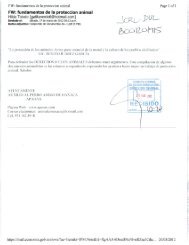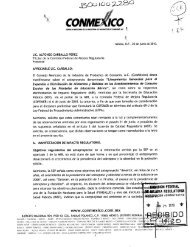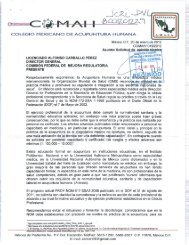Untitled
Untitled
Untitled
You also want an ePaper? Increase the reach of your titles
YUMPU automatically turns print PDFs into web optimized ePapers that Google loves.
increased physical activity has been associated with a major<br />
decrease in incidence of type 2 diabetes and other metabolic<br />
disturbances (Tuomilehto et al., 2001; Knowler et al., 2002).<br />
The high prevalence of overweight and obesity indicates that<br />
energy imbalance is a population-wide phenomenon in<br />
many societies across the world. In addition to interventions<br />
aimed at individuals, rigorous changes in the social and<br />
physical environment including the food supply that reduce<br />
stimuli to overeat and facilitate greater physical activity will<br />
be needed to target the epidemic of obesity.<br />
Although more randomized longer-term trials of diet and<br />
body weight have been conducted in recent years, many<br />
caveats exist in the current evidence and further research<br />
efforts to address this topic that is of pivotal importance for<br />
public health is strongly recommended.<br />
Conclusions and recommendations<br />
Carbohydrates are among the macronutrients that provide<br />
energy and can thus contribute to excess energy intake and<br />
subsequent weight gain. If energy intake is strictly controlled,<br />
macronutrient composition of the diet (energy<br />
percentages of fat and carbohydrates) does not substantially<br />
affect body weight or fat mass (Golay et al., 1996). However,<br />
an important issue is whether among free-living individuals,<br />
macronutrient composition of the diet increases the likelihood<br />
of passive over-consumption. There is no clear<br />
evidence that altering the proportion of total carbohydrate<br />
in the diet is an important determinant of energy intake.<br />
However, there is evidence that sugar-sweetened beverages<br />
do not induce satiety to the same extent as solid forms of<br />
carbohydrate and that increases in sugar sweetened soft<br />
drink consumption are associated with weight gain. Thus,<br />
there is a justification for the recommendation to restrict the<br />
use of beverages high in free sugars in order to reduce the risk<br />
of excessive weight gain and to treat obesity. Solid foods high<br />
in free sugars tend to be energy dense, and there is some<br />
evidence from intervention studies that reduction of solid<br />
foods high in free sugars can contribute to weight loss. Thus,<br />
the current recommendation to restrict free sugars to no<br />
more than 10 percent of total energy is consistent with<br />
appropriate diets for the prevention of obesity. A high<br />
content of dietary fiber in whole-grain cereals, vegetables,<br />
legumes and fruits is associated with relatively low energy<br />
density, promotion of satiety, and in observational studies a<br />
lesser degree of weight gain than among those with lower<br />
intakes. Although it is difficult to establish with certainty<br />
that dietary fiber rather than other dietary attributes are<br />
responsible, it is considered appropriate to recommend that<br />
whole grain cereals, vegetables, legumes and fruits are the<br />
most appropriate sources of dietary carbohydrate. The<br />
currently available evidence is considered to be insufficient<br />
to recommend carbohydrate-containing foods likely to<br />
reduce the risk of obesity or promote weight loss on the<br />
basis of their GI.<br />
Carbohydrate intake and obesity<br />
RM van Dam and JC Seidell<br />
Acknowledgements<br />
We thank Dr Ahmad R Dorosty, Dr Cara Ebbeling, Professor<br />
Philip James, Professor Simin Liu, Professor Jim Mann,<br />
Professor Boyd Swinburn, Professor Carolyn Summerbell<br />
and Dr Ricardo Uauy for their valuable comments on the<br />
earlier manuscript.<br />
Conflict of interest<br />
During preparation and peer-review of this paper in 2006, the<br />
authors and peer-reviewers declared the following interests.<br />
Authors<br />
Dr Rob M van Dam: None declared.<br />
Professor Jaap C Seidell: None declared.<br />
Peer-reviewers<br />
Dr Ahmad R Dorosty: None declared.<br />
Dr Cara Ebbeling: None declared.<br />
Professor Philip James: None declared.<br />
Professor Simin Liu: None declared.<br />
Professor Jim Mann: None declared.<br />
Professor Boyd Swinburn: None declared.<br />
Professor Carolyn Summerbell: None declared.<br />
Dr Ricardo Uauy: Scientific Adviser on a temporary basis<br />
for Unilever and Wyeth; Scientific Editorial/Award Adviser<br />
for Danone, DSM, Kelloggs, and Knowles and Bolton on an<br />
ad hoc basis.<br />
References<br />
Alexy U, Sichert-Hellert W, Kersting M (2003). Associations between<br />
intake of added sugars and intakes of nutrients and food groups in<br />
the diets of German children and adolescents. Br J Nutr 90, 441–447.<br />
Anderson JW, Story LJ, Zettwoch NC, Gustafson NJ, Jefferson BS<br />
(1989). Metabolic effects of fructose supplementation in diabetic<br />
individuals. Diabetes Care 12, 337–344.<br />
Anonymous (1968). The National Diet-Heart Study Final Report.<br />
Circulation 37, I1–I428.<br />
Appel LJ, Moore TJ, Obarzanek E, Vollmer WM, Svetkey LP, Sacks FM<br />
et al. (1997). A clinical trial of the effects of dietary patterns on<br />
blood pressure. DASH Collaborative Research Group. N Engl J Med<br />
336, 1117–1124.<br />
Astrup A, Meinert Larsen T, Harper A (2004). Atkins and other lowcarbohydrate<br />
diets: hoax or an effective tool for weight loss?<br />
Lancet 364, 897–899.<br />
Baron JA, Schori A, Crow B, Carter R, Mann JI (1986). A randomized<br />
controlled trial of low carbohydrate and low fat/high fiber diets for<br />
weight loss. Am J Public Health 76, 1293–1296.<br />
Berkey CS, Rockett HR, Field AE, Gillman MW, Colditz GA (2004). Sugaradded<br />
beverages and adolescent weight change. Obes Res 12, 778–788.<br />
Bes-Rastrollo M, Martinez-Gonzalez MA, Sanchez-Villegas A, de la<br />
Fuente Arrillaga C, Martinez JA (2006a). Association of fiber intake<br />
and fruit/vegetable consumption with weight gain in a Mediterranean<br />
population. Nutrition 22, 504–511.<br />
Bes-Rastrollo M, Sanchez-Villegas A, Gomez-Gracia E, Martinez JA,<br />
Pajares RM, Martinez-Gonzalez MA (2006b). Predictors of weight<br />
gain in a Mediterranean cohort: the Seguimiento Universidad de<br />
Navarra Study 1. Am J Clin Nutr 83, 362–370;quiz 394–395.<br />
Birketvedt GS, Shimshi M, Erling T, Florholmen J (2005). Experiences<br />
with three different fiber supplements in weight reduction. Med Sci<br />
Monit 11, PI5–PI8.<br />
S95<br />
European Journal of Clinical Nutrition
















